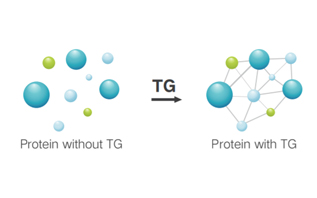Transglutaminase
Enzyme transglutaminase (TG) is a natural enzyme that crosslinks proteins together by linking the epsilon amino group of lysine in one protein to the carboxyl group of aspartic or glutamic acids in another protein. It is naturally present in the majority of organisms tissues and involved in various biological processes.
Our TG is fermented from streptoverticillium mobaraense and is characterized by strong binding force, good PH and thermal stability, impressive solubility, and most importantly, safety.
In commercial food processing, transglutaminase TG can perform as a binding agent and be applied in texture improvement, meat reconstruction and diary products. Transglutaminase uses in food is more common include steak, fish balls, surimi, ham, imitation crabmeat, etc. As a professional transglutaminase manufacturer, Yiming can provide you with high-quality transglutaminase in food at a reasonable price.
Mechanism

-
Optimum PH and Temperature

Key Benefits of Transglutaminase in Food
Natural and safe
Clean label
Wide application in food processing
Texture and juiciness improvement
Easy to operate
No additional additives or process required
No impact on taste or flavour
Models of Transglutaminase in Food
Transglutaminase FAQs
-
Is enzyme TG safe?
TG is safe. It will not harm you or stick your hands. There are a lot of controversies about the safety of TG, while it has been recognized by the FDA as GRAS (Generally Recognized as Safe). It has been approved in the US, Japan, Europe and numerous other countries.
-
What are the storage conditions of TG enzyme?
TG has a limited shelf life as you deal with live enzymes. You need to keep it at cool temperatures or refrigerated until you use it. Once an enzyme is opened, you need to wrap it tightly and store it in the freezer.
-
What are the safety precautions when using TG?
As with many other food products, you need to be careful about thecross-contamination as you need to put meat outside when sticking meat, where usually has a higher content of bacteria. Chilled cuts may restrain the bacteria growth.
-
What are the regular transglutaminase uses?
Microbial transglutaminase can be used in red meat, poultry, sausages, meatballs, surimi products, fish meat, Chiba tofu, fresh cheese and yoghurt.







